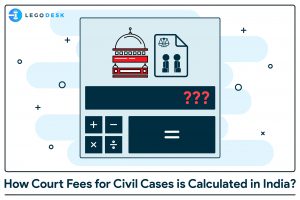How court fees are calculated in India?

Introduction
The earliest Act for determining court fees in India is the Court- fees Act, 1870. When the Courts were established, the need for an Act was realized for the payment of fees for resolving disputes. The court fee to be paid depends upon the asset value and varies from state to state. Court fee also depends upon the nature of the dispute between the parties before the Court.
Right to justice has been recognized as a ‘basic human right’ around the world, and high rates of Court fees is only a violation of this right. The 189th Law Commission Report on ‘Revision of Court Fees Structure’ recognized the right of all the citizens to access to justice and the primary duty of the State to provide right machinery for administration of justice. It was also observed that a high Court fee prevents frivolous litigants, but at the same time, a high rate of Court fee can also discourage genuine litigants. Therefore, the rate of Court fee needs to be determined very diligently.
Read More: Advance Tax Payment
Calculation of Court Fees
The Court fee payable in any Court except the Supreme Court of India falls under Entry 3 of List II of Schedule Seventh to the Constitution of India which falls under the State List. As the levying of Court fee is part of the State List, the states are at liberty to amend or change the Court Fees Act, 1870 in application to their respective states and can enact their own Court fees legislation. But the basic structure of payment of Court fees remains the same. Section 7 of the Court Fees Act, 1870, enlists the computation of fees payable in certain suits. The valuation of the court fee under this section depends upon the subject matter of the suit.
Court fee in the following civil cases is estimated at a certain amount, based on the valuation of the property:
- Suits involving money (includes suits for damages/compensation, or maintenance, annuities or of other payable sums) – The Court fee is to be determined according to the amount claimed.
- Suits of maintenance and annuities or other sums payable periodically – The Court fee is to be determined according to the value of the subject-matter of the suit, the value is ten times the amount claimed to be payable in a year.
- Suits for movable property (not being money) where the subject matter has a market value – The Court fee is to be determined according to the market value at the date of presenting the plaint.
- Suit having the subject matter of no market value- The Court fee is to be determined according to the amount at which the relief sought is valued in the plaint or memorandum; the plaintiff shall state the amount at which he values the relief sought.
- Suits for the possession of land, houses, or gardens – The Court fee is to be determined according to the value of the subject matter. In case the land forms an entire estate from which the Government earns some permanently settled revenue, then the court fee would be according to the value of subject matter which will be ten times the revenue so payable. In case the revenue is settled, but not permanently, then the amount will be five times the revenue so payable. Where no revenue is obtained from the land, land is exempted from paying revenue or is charged with a fixed payment in return of such revenue, then the amount will be fifteen times of the net profits during the year next before the date of presenting the plaint and if no profit, then according to the value of similar land in the neighborhood.
In most of the civil cases, the Court fee is determined by the market value of the movable/ immovable property involved in the subject matter of the suit. For example, in a suit for partition, the market value of the share in respect of which the suit has been instituted will be used to determine the Court fee. Other than that, every state has amended the Court Fees Act, 1870 to meet special needs.
Read Also: Funding for Legal Fees
For the suit instituted for joint possession in the court, if one does not take possession of the share of the property, the court fee will then be decided based on the amount of compensation sought by the individual in place of the share in the property. If the estimation of the value of the property is not possible, the court will charge a fixed fee.
Conclusion
Court fee is a certain percentage of the total value of the subject matter of the suit. The required amount of Court fee is different for every suit. It is simply a way to cover the administrative costs of the judicial process, or it just protects the revenue of the State. Every litigant is under an obligation to pay the requisite Court fee. There are also Legal Practice Management Softwares available that help lawyers to calculate the Court fee for civil cases directly.
How to deposit court fees
Notifications are very helpful.